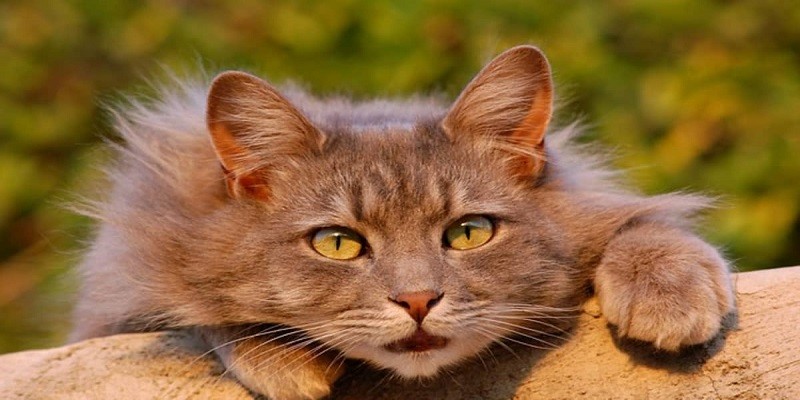Last Updated on January 14, 2025 by Pauline G. Carter
Yes, cats can get mad at their owners for various reasons such as neglecting them or disturbing their routine. Understanding their body language can help to prevent them from getting angry.
Cats are known for being independent pets, but this does not mean that they do not have emotions. They can express anger or displeasure in subtle ways that their owners may not fully comprehend. If a cat feels ignored or neglected, it may start to display behavioral changes such as aggression and scratching.
It is, therefore, important to understand their needs and preferences in order to prevent them from becoming upset. In this article, we will explore why cats may get mad at their owners and how to prevent it.

Credit: www.meowingtons.com
What Is Frustration In Cats?
Do cats get mad at you? Feline behavior can be challenging to interpret, particularly because your cat cannot use words to communicate their emotions. However, cats communicate through non-verbal cues such as body language and vocalizations.
Definition Of Frustration In Cats
Frustration can be defined as a complex emotional reaction to a situation that obstructs a cat from achieving a particular goal. Cats might become frustrated if they cannot get what they want, and it can result in undesirable behaviors. Some signs of feline frustration include:
- Aggression
- Excessive meowing or yowling
- Scratching furniture or other objects
- Eliminating outside of the litter box
Causes Of Frustration In Cats
Frustration in cats can stem from various factors, such as:
- Hunger: Cats require regular meals, and if their owners fail to provide food on time, the cat may become frustrated.
- Inadequate resources: If the cat’s litter box is dirty or they don’t have enough toys to play with, the cat can become anxious and frustrated.
- Unfulfilled desires: Cats are natural predators, and if they are unable to hunt or play, they may develop pent-up energy that can lead to frustration.
- Environmental changes: Cats are creatures of habit, and any significant changes can upset them. Such changes may include rearranging the furniture or introducing a new pet or family member into the home.
Understanding what causes frustration in cats can help owners prevent undesirable behaviors and provide a better quality of life for their furry friends.
Frustration in cats is a real and common issue that can result in undesirable behaviors. By ensuring that cats have adequate resources, regular meals, and plenty of opportunities to play and hunt, owners can help reduce their cat’s frustration and maintain a happy and healthy home environment.
Indicators That Your Cat Might Be Angry
Do Cats Get Mad At You?
Cats can be wonderful pets, but their behavior can be unpredictable. Many cat owners have experienced an angry feline at some point. If you are a cat owner, there are signs and behaviors that you should look out for to determine if your cat is angry or frustrated.
General Behaviors And Body Language Of Cats
- Cats typically show their emotions through their body language. A cat that is angry will demonstrate the following behaviors:
- Arching of the back and fluffing up of the fur
- Hissing or growling
- Tail twitching or lashing
- Dilated pupils
- Ears rotated back
- Avoidance of eye contact
- Reluctance to engage with humans or other pets
Common Signs Of Anger And Frustration In Cats
- Cats exhibit their frustration in a variety of ways. Some signs that your cat may be angry or frustrated include:
- Hiding or sleeping excessively
- Scratching furniture or household items
- Urinating or defecating outside the litter box
- Refusal to eat or drink
- Increased aggression towards humans or other animals
- Inappropriate vocalization or meowing
- Excessive grooming or licking
Remember that these behaviors could also be due to other issues such as illness or changes in their environment. If your cat is exhibiting any concerning changes in behavior, it is best to seek advice from a veterinarian.
Cats can get mad and show signs of anger, frustration or discomfort through their behavior and body language. As a responsible pet owner, it is essential to be aware and watch for any changes in our cat’s behavior and seek advice from a veterinarian if we have any concerns.
How Do You Avoid Making Your Cat Angry?
Do cats get mad at you? The answer is a resounding yes! Just like humans, cats can feel a wide range of emotions, including anger. If you have a feline friend at home, it’s essential to know how to keep them happy and content.
Here’s how you can avoid making your cat angry.
Creating A Comfortable And Secure Environment
- Give your cat a cozy and safe space to relax in.
- Make sure their litter box is in a quiet and accessible area.
- Keep their food and water bowls clean and within reach.
- Provide toys and scratching posts to prevent boredom and destructive behavior.
Understanding Your Cat’S Basic Needs
- Give your cat enough attention and physical affection daily.
- Feed your cat a balanced and nutritious diet.
- Provide fresh water daily.
- Regularly groom your cat and keep their claws trimmed.
- Ensure your cat gets enough exercise and playtime.
Building Trust With Your Cat
- Avoid sudden movements or loud noises that may startle or frighten your cat.
- Allow your cat to approach you on their terms.
- Don’t force physical affection on your cat.
- Respect your cat’s boundaries and personal space.
- Spend time with your cat regularly.
Positive Reinforcement Training Techniques
- Reward good behavior with treats, praise, or playtime.
- Use a calm voice to correct bad behavior immediately.
- Redirect your cat’s attention to an appropriate activity if they are misbehaving.
- Be consistent with training techniques.
- Avoid using punishment or negative reinforcement, as this can damage the bond between you and your cat.
By creating a happy and comfortable environment, understanding your cat’s needs, building trust, and using positive reinforcement training techniques, you can avoid making your cat angry. Remember, a happy and content cat makes for a happy pet parent!
Frequently Asked Questions On Do Cats Get Mad At You?
Do Cats Hold Grudges Against Their Owners?
Cats might get upset about something, but they typically forgive quickly. They are unlikely to hold grudges.
Can Cats Get Angry And Aggressive?
Yes, cats can get angry and aggressive, but it is usually in response to a perceived threat or fear.
How Do Cats Express Their Displeasure?
Cats may hiss, scratch, or swat at their owners when they are displeased. They may also avoid interaction.
Can Cats Sense When Their Owners Are Upset?
Yes, cats can sense when their owners are upset and may try to offer comfort in their own way.
How Can I Prevent My Cat From Becoming Angry?
Provide a comfortable environment, fulfill their needs, and respond to their behavioral cues to prevent your cat from becoming angry.
Conclusion
As we observed, cats are complex animals that can experience a wide range of emotions. While they might not feel the same way humans do, they have distinct personalities and preferences. It is safe to say that cats do get mad at their owners, but most of the time, it is in response to something that has been done to them, such as ignoring their needs or showing them aggression.
In these situations, it is essential to understand the root cause of their anger and try to resolve the issue. Keep in mind that cats are not vindictive creatures, and with time and effort, their moods can improve. As responsible cat owners, it is our job to foster a healthy and happy relationship with our feline companions, and that means being vigilant of their emotional needs and providing them with love and care.

